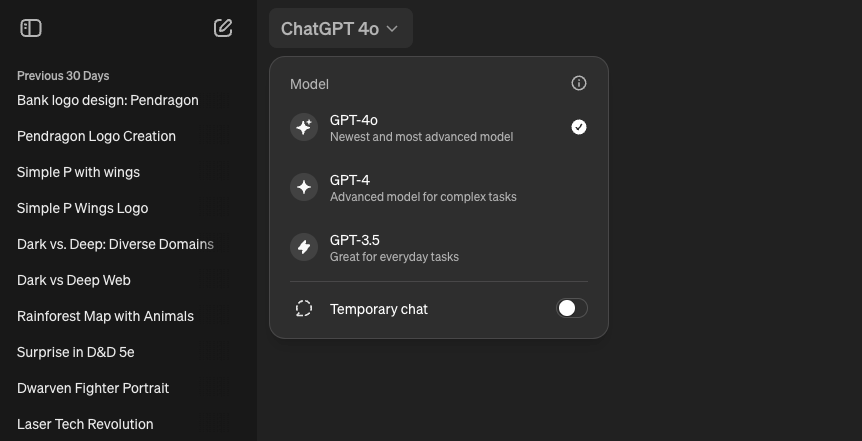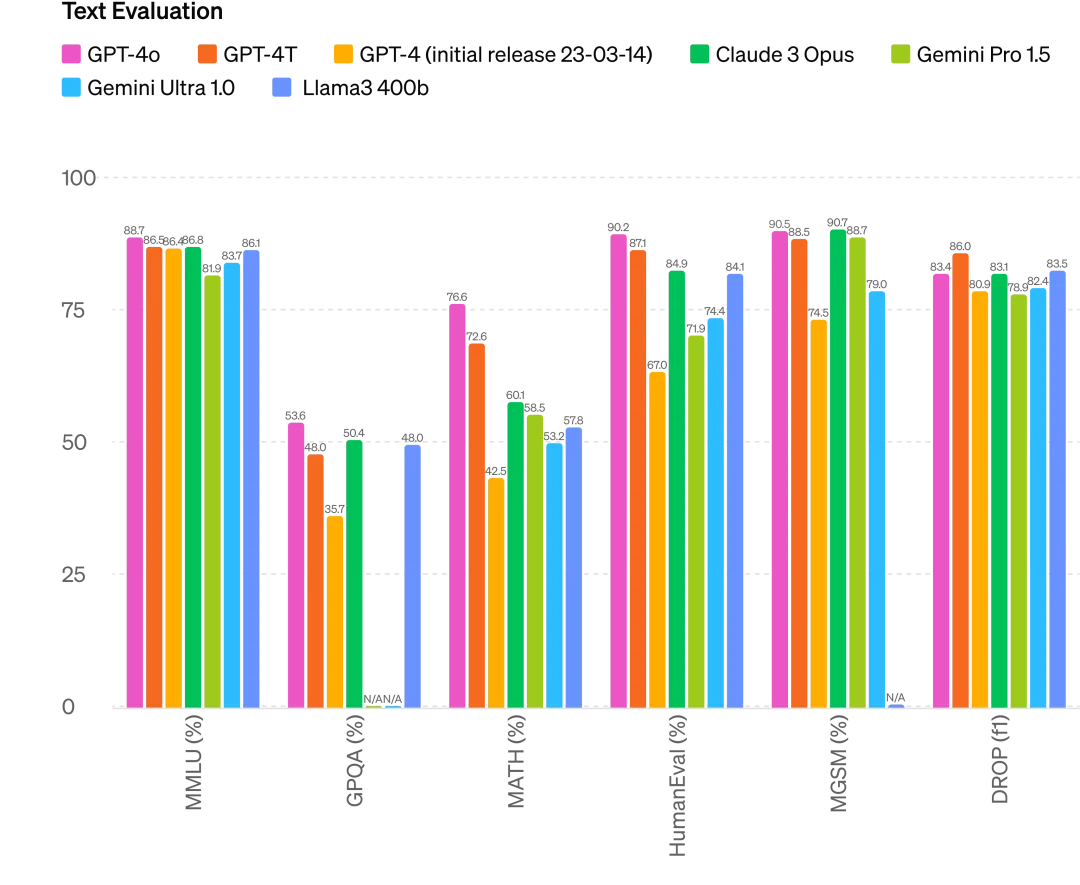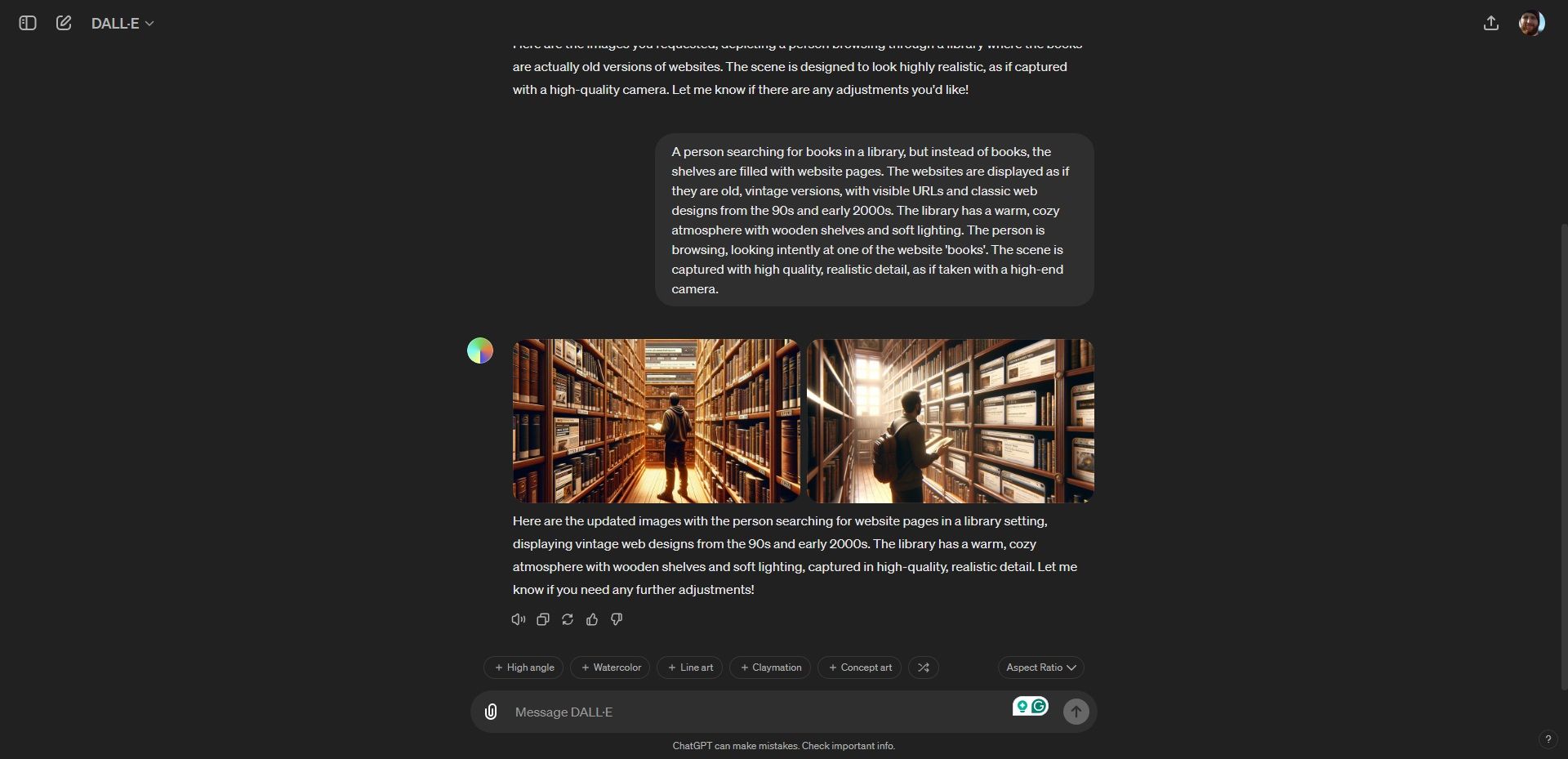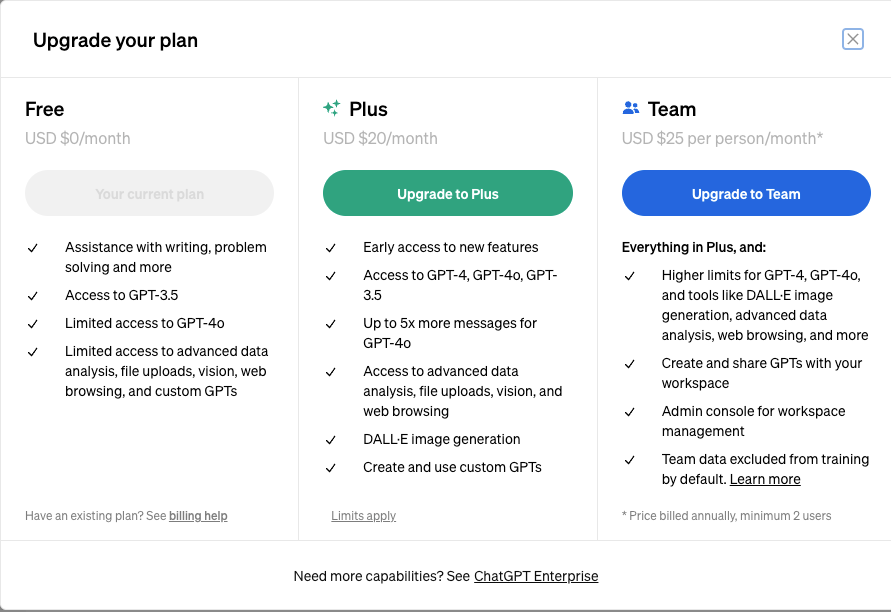 Front page > AI > GPT-4 Is Now Free for Everyone, but There Are Still 6 Reasons to Keep Using ChatGPT Plus
Front page > AI > GPT-4 Is Now Free for Everyone, but There Are Still 6 Reasons to Keep Using ChatGPT Plus
GPT-4 Is Now Free for Everyone, but There Are Still 6 Reasons to Keep Using ChatGPT Plus
Following OpenAI's Spring Update, GPT-4o has become publicly available to Free users. This means that everyone can access GPT-4-level intelligence without paying. You might wonder why you would want to keep paying $20 monthly when you can get it for free.
Well, here are some reasons you might want to keep your ChatGPT Plus sub.
1 More Access to GPT-4o

GPT-4o is OpenAI's latest flagship GPT model, which it states is twice as fast as GPT-4 Turbo and 50% cheaper (when using APIs). However, Free users are not granted unlimited access to GPT-4o. OpenAI provides Free users with "limited access to GPT-4o."
GPT-4o is now ChatGPT's default model, but Free users will be reverted to GPT-3.5 when it's unavailable. As a Free user, your access to GPT-4o is not guaranteed and is subject to availability. The term "limited access" implies usage restrictions or reduced availability during peak times.
Regardless, one thing is for certain: ChatGPT Plus users will get up to five times more messages for GPT-4o. Furthermore, Plus users can send up to 80 messages every three hours. From that, we can infer that Free users would get about 16 messages per hour on a good day. It's not bad, but it's quite low if you're a heavy user.
However, all of these message rates are the best you will get. As ChatGPT becomes the crutch for more businesses and individuals, usage and availability will likely decline (temporarily) in the near future. Based on this, you'd likely want a Plus subscription to insure against crowded conditions.
2 Retain Access to GPT-4 Turbo
Benchmarks and tests revealed that GPT-4o may be faster, but GPT-4 Turbo seems more accurate in some categories. It's difficult to confirm the criteria for this and how some of these tests have been executed, but some users have reported better results from GPT-4—especially in mathematical and programming problems. Even OpenAI admits this, and according to its text evaluation results, GPT-4T does better at DROP (Discrete Reasoning Over Paragraphs) tests.

If some arbitrary tests don't convince you, consider the number of extra GPT-4 prompts you'll get from a sub. OpenAI allows 40 messages every three hours on GPT-4T and 80 messages every three hours on GPT-4o, giving you a grand total of 120 messages you can send to the GPT-4s in three hours.
3 Create Your Own Custom GPT
OpenAI will allow Free users to access the GPT store and use custom GPTs as part of its free package. However, this allowance doesn't extend to the creation of custom GPTs.
You must have a Plus subscription to create custom GPTs. Paying will let you build a custom GPT with your own data and documents, which can then be shared with friends and colleagues or published freely on the marketplace.
4 Generate Images With DALL-E

When OpenAI announced the slew of features coming to ChatGPT's Free tier, they didn't mention direct access to its image generation AI, DALL-E. With DALL-E, you can enter any prompt, and the AI will attempt to create an image from your text. It's pretty useful, and it's easily half the reason why I keep my Plus subscription. Even with access to GPT-4o, Free users cannot generate images from text—all DALL-E capabilities are locked behind the subscription paywall.
We are uncertain how this will translate to Free users' access to the GPT store, seeing as many custom GPTs rely on DALL-E. But it's very likely going to be completely unavailable until you pay.
5 Get Early Access to ChatGPT Voice Mode and the ChatGPT Desktop App
OpenAI's demo of GPT-4o made waves on the internet because of its realistic Voice Mode. Due to how quickly GPT-4o can understand words and context, none of that characteristic delay happens while the AI is "thinking," making for fluid—humanlike—conversation. On top of that, you can essentially video call the AI while in Voice Mode, and it will understand visual cues and objects it sees (thanks to its vision capabilities).
This new Voice Mode is not yet generally available, but Plus users will receive it as an early access feature. If you want to use this technology before most people, you'll need to keep your ChatGPT subscription up and running.
While OpenAI's recent demo showed us that the feature will come with the Mac app, Voice Mode is only available now through the ChatGPT smartphone app. Features like this are why many consider the ChatGPT iOS app better than the website.
OpenAI also introduced us to a ChatGPT desktop in its demo. That is undoubtedly one of the early access features paid users will enjoy, and is first coming to macOS users. There may be more cool features down the line that offer very good value propositions, and paying for Plus is the only way to be among those who use it.
6 Full Access to Advanced Data Analysis, File Uploads, Vision, and Web Browsing

Advanced data analysis, file uploads, vision, and web browsing were once features exclusive to OpenAI's paying customers. That has now changed, and all of these are available to Free users but with more limits. The limits include fewer prompts, fewer file uploads, and lower priority access to these services during peak hours.
For some, this has disincentivized carrying on a Plus subscription. However, you will need a subscription if you're a heavy ChatGPT user and rely on it to understand, parse, and analyze documents and photos. Granted, these are features that many don't use very often, but if you fall within the minority, you might want to keep your Plus sub.
Also, having full access to web browsing is super useful. ChatGPT has a knowledge cutoff, and web browsing helps bridge that knowledge gap by letting it search the web to find current information. If you use ChatGPT for tasks that require current information, you might get frustrated with a Free plan.
Frankly, all the reasons for getting a ChatGPT Plus subscription are subject to how much you use the AI. If you use it a lot, you'll find yourself hitting the limits very often. It can be well worth the money if you can afford it and don't mind beta-testing new OpenAI features.
-
 8 essential free and paid API recommendations for LLMHarnessing the Power of LLMs: A Guide to APIs for Large Language Models In today's dynamic business landscape, APIs (Application Programming Inter...AI Posted on 2025-04-21
8 essential free and paid API recommendations for LLMHarnessing the Power of LLMs: A Guide to APIs for Large Language Models In today's dynamic business landscape, APIs (Application Programming Inter...AI Posted on 2025-04-21 -
 User Guide: Falcon 3-7B Instruct ModelTII's Falcon 3: A Revolutionary Leap in Open-Source AI TII's ambitious pursuit of redefining AI reaches new heights with the advanced Falcon 3...AI Posted on 2025-04-20
User Guide: Falcon 3-7B Instruct ModelTII's Falcon 3: A Revolutionary Leap in Open-Source AI TII's ambitious pursuit of redefining AI reaches new heights with the advanced Falcon 3...AI Posted on 2025-04-20 -
 DeepSeek-V3 vs. GPT-4o and Llama 3.3 70B: The Strongest AI Model RevealedThe evolution of AI language models has set new standards, especially in the coding and programming landscape. Leading the c...AI Posted on 2025-04-18
DeepSeek-V3 vs. GPT-4o and Llama 3.3 70B: The Strongest AI Model RevealedThe evolution of AI language models has set new standards, especially in the coding and programming landscape. Leading the c...AI Posted on 2025-04-18 -
 Top 5 AI intelligent budgeting toolsUnlocking Financial Freedom with AI: Top Budgeting Apps in India Are you tired of constantly wondering where your money goes? Do bills seem to devour...AI Posted on 2025-04-17
Top 5 AI intelligent budgeting toolsUnlocking Financial Freedom with AI: Top Budgeting Apps in India Are you tired of constantly wondering where your money goes? Do bills seem to devour...AI Posted on 2025-04-17 -
 Detailed explanation of Excel SUMPRODUCT function - School of Data AnalysisExcel's SUMPRODUCT Function: A Data Analysis Powerhouse Unlock the power of Excel's SUMPRODUCT function for streamlined data analysis. This ve...AI Posted on 2025-04-16
Detailed explanation of Excel SUMPRODUCT function - School of Data AnalysisExcel's SUMPRODUCT Function: A Data Analysis Powerhouse Unlock the power of Excel's SUMPRODUCT function for streamlined data analysis. This ve...AI Posted on 2025-04-16 -
 In-depth research is fully open, ChatGPT Plus user benefitsOpenAI's Deep Research: A Game-Changer for AI Research OpenAI has unleashed Deep Research for all ChatGPT Plus subscribers, promising a significan...AI Posted on 2025-04-16
In-depth research is fully open, ChatGPT Plus user benefitsOpenAI's Deep Research: A Game-Changer for AI Research OpenAI has unleashed Deep Research for all ChatGPT Plus subscribers, promising a significan...AI Posted on 2025-04-16 -
 Amazon Nova Today Real Experience and Review - Analytics VidhyaAmazon Unveils Nova: Cutting-Edge Foundation Models for Enhanced AI and Content Creation Amazon's recent re:Invent 2024 event showcased Nova, its ...AI Posted on 2025-04-16
Amazon Nova Today Real Experience and Review - Analytics VidhyaAmazon Unveils Nova: Cutting-Edge Foundation Models for Enhanced AI and Content Creation Amazon's recent re:Invent 2024 event showcased Nova, its ...AI Posted on 2025-04-16 -
 5 ways to use ChatGPT timing task functionChatGPT's New Scheduled Tasks: Automate Your Day with AI ChatGPT recently introduced a game-changing feature: Scheduled Tasks. This allows users ...AI Posted on 2025-04-16
5 ways to use ChatGPT timing task functionChatGPT's New Scheduled Tasks: Automate Your Day with AI ChatGPT recently introduced a game-changing feature: Scheduled Tasks. This allows users ...AI Posted on 2025-04-16 -
 Which of the three AI chatbots respond to the same prompt is the best?With options like Claude, ChatGPT, and Gemini, choosing a chatbot can feel overwhelming. To help cut through the noise, I put all three to the test us...AI Posted on 2025-04-15
Which of the three AI chatbots respond to the same prompt is the best?With options like Claude, ChatGPT, and Gemini, choosing a chatbot can feel overwhelming. To help cut through the noise, I put all three to the test us...AI Posted on 2025-04-15 -
 ChatGPT is enough, no dedicated AI chat machine is neededIn a world with new AI chatbots launching daily, it can be overwhelming to decide which one is the right “one.” But in my experience, ChatGPT handles ...AI Posted on 2025-04-14
ChatGPT is enough, no dedicated AI chat machine is neededIn a world with new AI chatbots launching daily, it can be overwhelming to decide which one is the right “one.” But in my experience, ChatGPT handles ...AI Posted on 2025-04-14 -
 Indian AI Moment: Competition with China and the United States in Generative AIIndia's AI Ambitions: A 2025 Update With China and the US heavily investing in Generative AI, India is accelerating its own GenAI initiatives. Th...AI Posted on 2025-04-13
Indian AI Moment: Competition with China and the United States in Generative AIIndia's AI Ambitions: A 2025 Update With China and the US heavily investing in Generative AI, India is accelerating its own GenAI initiatives. Th...AI Posted on 2025-04-13 -
 Automating import of CSV to PostgreSQL using Airflow and DockerThis tutorial demonstrates building a robust data pipeline using Apache Airflow, Docker, and PostgreSQL to automate data transfer from CSV files to a ...AI Posted on 2025-04-12
Automating import of CSV to PostgreSQL using Airflow and DockerThis tutorial demonstrates building a robust data pipeline using Apache Airflow, Docker, and PostgreSQL to automate data transfer from CSV files to a ...AI Posted on 2025-04-12 -
 Swarm Intelligence Algorithms: Three Python ImplementationsImagine watching a flock of birds in flight. There's no leader, no one giving directions, yet they swoop and glide together in perfect harmony. It may...AI Posted on 2025-03-24
Swarm Intelligence Algorithms: Three Python ImplementationsImagine watching a flock of birds in flight. There's no leader, no one giving directions, yet they swoop and glide together in perfect harmony. It may...AI Posted on 2025-03-24 -
 How to Make Your LLM More Accurate with RAG & Fine-TuningImagine studying a module at university for a semester. At the end, after an intensive learning phase, you take an exam – and you can recall th...AI Posted on 2025-03-24
How to Make Your LLM More Accurate with RAG & Fine-TuningImagine studying a module at university for a semester. At the end, after an intensive learning phase, you take an exam – and you can recall th...AI Posted on 2025-03-24 -
 What is Google Gemini? Everything You Need To Know About Google’s ChatGPT RivalGoogle recently released its new Generative AI model, Gemini. It results from a collaborative effort by a range of teams at Google, including members ...AI Posted on 2025-03-23
What is Google Gemini? Everything You Need To Know About Google’s ChatGPT RivalGoogle recently released its new Generative AI model, Gemini. It results from a collaborative effort by a range of teams at Google, including members ...AI Posted on 2025-03-23
Study Chinese
- 1 How do you say "walk" in Chinese? 走路 Chinese pronunciation, 走路 Chinese learning
- 2 How do you say "take a plane" in Chinese? 坐飞机 Chinese pronunciation, 坐飞机 Chinese learning
- 3 How do you say "take a train" in Chinese? 坐火车 Chinese pronunciation, 坐火车 Chinese learning
- 4 How do you say "take a bus" in Chinese? 坐车 Chinese pronunciation, 坐车 Chinese learning
- 5 How to say drive in Chinese? 开车 Chinese pronunciation, 开车 Chinese learning
- 6 How do you say swimming in Chinese? 游泳 Chinese pronunciation, 游泳 Chinese learning
- 7 How do you say ride a bicycle in Chinese? 骑自行车 Chinese pronunciation, 骑自行车 Chinese learning
- 8 How do you say hello in Chinese? 你好Chinese pronunciation, 你好Chinese learning
- 9 How do you say thank you in Chinese? 谢谢Chinese pronunciation, 谢谢Chinese learning
- 10 How to say goodbye in Chinese? 再见Chinese pronunciation, 再见Chinese learning
























